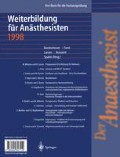Zusammenfassung
Die Erörterung der Gestose im Rahmen der Weiterbildungsreihe einer anästhesiologischen Fachzeitschrift scheint nur auf den ersten Blick verwunderlich. Die vielgestaltige Symptomatik der Erkrankung, die teilweise dramatische Progredienz der Krankheitssymptome und das Fehlen einer kausalen Therapie erfordern eine hohe Fachkompetenz aller an der Behandlung von Gestosepatientinnen beteiligten Ärzte. In diesem Beitrag werden die wichtigsten Erkenntnisse zum Erkrankungskomplex„Gestose“ zusammengefaßt, die für die anästhesiologische und intensivmedizinische Behandlung von Patientinnen mit Gestose bedeutsam sind.
Access this chapter
Tax calculation will be finalised at checkout
Purchases are for personal use only
Preview
Unable to display preview. Download preview PDF.
Literatur
CLASP (collaborative Low-Dose Aspirin Study in Pregnancy) Collaborative Study Group (1994) CLASP: a randomised trial of low-dose aspirin for the prevention and treatment of preeclampsia among 9364 pregnant women. Lancet 343:619–629
Brown M,Zammit V,Mitar DM,Whitworth JA (1992)Extracellular fluid volumes in pregnancy-induced hypertension. J Hypertens 10:61–68
Brown MA (1995) The physiology of pre-eclampsia. Clin Exp Pharmacol Physiol 22:781–791
Davey DA, MacGillivray I (1988) The classification and definition of the hypertensive disorders of pregnancy. Am J Obstet Gynecol 158:892–898
Donaldson JO (1992)The case against magnesium sulfate for eclamptic convulsions. Int J Obstet Anesth 1:159–166
Eclampsia Trial Collaborative Group (1995)Which anticonvulsant for women with eclampsia? Evidence from the Collaborative Eclampsia Trial. Lancet 345:1455–1463
Gallery EDM (1995)Hypertension in pregnancy: Practical management recommendations. Drugs 49:555–562
Knox TA,Olans LB (1996)Liver disease in pregnancy. New Engl J Med 335:569–575
Lucas MJ, Leveno KJ, Cunningham FG (1995)A comparison of magnesium sulfate with Phenytoin for the prevention of eclampsia. New Engl J Med 333:201–205
Mushambi MC, Halligan AW, Williamson K (1996)Recent developments in the pathophysiology and management of pre-eclampsia. Br J Anaesth 76:133–148
Pipkin FB, Growther C, De Swiet M, Duley L, Judd A, Lilford RJ, Onwude J, Prentice C, Redman CWG, Roberts J,Thornton J, Walker J (1996)Where next for prophylaxis against pre-eclampsia. Br J Obstet Gynaecol 103:603–607
Schiff P, Pelegg E, Goldenberg N, Rosenthal T, Ruppin R, Tamarkin M, Barkai G, Ben-Baruch G, Blankstein J, Goldman B, Mashiach S (1989) The use of Aspirin to prevent pregnancy induced hypertension and lower the ratio of thromboxane A2 to prostacyclin in relatively high risk pregnancies. N Engl J Med 321:351–356
Sibai BM (1990)Eclampsia — VI.Maternal-perinatal outcome in 254 consecutive cases. Am J Obstet Gynecol 163:1049–1055
Sibai BM, Mercer BM, Schiff E, Friedman SA (1994)Aggressive versus expectant management of severe preeclampsia at 28 to 32 weeks’ gestation: A randomized controlled trial. Am J Obstet Gynecol 171:818–822
Sibai BM, Ramadan MK, Usta I, Salama BM, Friedman SA (1993)Maternal morbidity and mortality in 442 pregnancies with hemolysis, elevated liver enzymes, and low platelets (HELLP syndrome). Am J Obstet Gynecol 169:1000–1006
Sibai BM, Ramanathan J (1992) The case for magnesium sulfate in preeclampsia-eclampsia.Int J Obstet Anesth 1:167–175
Taner CE, Hakverdi AU, Aban M, Erden AC, Özelbaykal U (1996) Prevalence, management and outcome in eclampsia. Int J Gynecol Obstet 53:11–15
Visser W, Wallenburg HCS (1995) Temporising management of severe pre-eclampsia with and without the HELLP syndrome. Br J Obstet Gynaecol 102:111–117
Wallace DH, Levens KJ, Cunningham GF, Giesecke AH, Sheaver VE, Sidawi JE (1995)Randomized comparison of general and regional anesthesia for cesaren delivery in pregnancies complicated by servere preeclampsia. Obstert Gynaecol 86:193–199
Author information
Authors and Affiliations
Editor information
Editors and Affiliations
Rights and permissions
Copyright information
© 1998 Springer-Verlag Berlin Heidelberg
About this chapter
Cite this chapter
Frey, L. (1998). Gestose und HELLP-Syndrom. In: Bardenheuer, H.J., Forst, H., Larsen, R., Rossaint, R., Spahn, D.R. (eds) Der Anaesthesist Weiterbildung für Anästhesisten 1998. Springer, Berlin, Heidelberg. https://doi.org/10.1007/978-3-642-72265-3_2
Download citation
DOI: https://doi.org/10.1007/978-3-642-72265-3_2
Publisher Name: Springer, Berlin, Heidelberg
Print ISBN: 978-3-540-64711-9
Online ISBN: 978-3-642-72265-3
eBook Packages: Springer Book Archive

